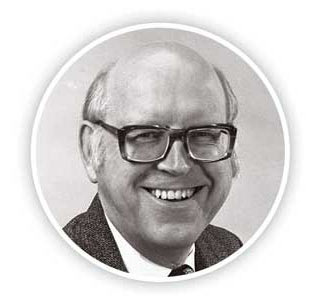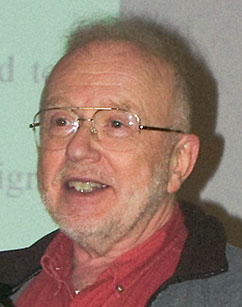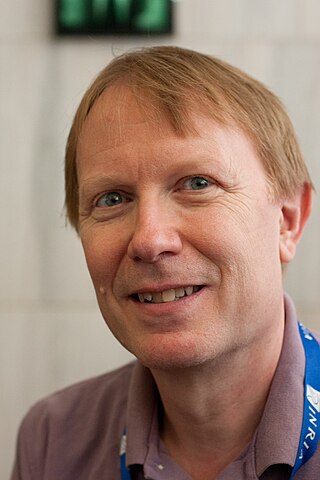Related Research Articles
The Association for Computing Machinery (ACM) is a US-based international learned society for computing. It was founded in 1947 and is the world's largest scientific and educational computing society. The ACM is a non-profit professional membership group, reporting nearly 110,000 student and professional members as of 2022. Its headquarters are in New York City.

John Kenneth Ousterhout is an American computer scientist. He is a professor of computer science at Stanford University. He founded Electric Cloud with John Graham-Cumming.
Feng-hsiung Hsu is a Taiwanese-American computer scientist and the author of the book Behind Deep Blue: Building the Computer that Defeated the World Chess Champion. His work led to the creation of the Deep Thought chess computer, which led to the first chess playing computer to defeat grandmasters in tournament play and the first to achieve a certified grandmaster-level rating.

Allen Newell was an American researcher in computer science and cognitive psychology at the RAND Corporation and at Carnegie Mellon University's School of Computer Science, Tepper School of Business, and Department of Psychology. He contributed to the Information Processing Language (1956) and two of the earliest AI programs, the Logic Theorist (1956) and the General Problem Solver (1957). He was awarded the ACM's A.M. Turing Award along with Herbert A. Simon in 1975 for their contributions to artificial intelligence and the psychology of human cognition.

Alan Jay Perlis was an American computer scientist and professor at Purdue University, Carnegie Mellon University and Yale University. He is best known for his pioneering work in programming languages and was the first recipient of the Turing Award.

David Lorge Parnas is a Canadian early pioneer of software engineering, who developed the concept of information hiding in modular programming, which is an important element of object-oriented programming today. He is also noted for his advocacy of precise documentation.
ChipTest was a 1985 chess playing computer built by Feng-hsiung Hsu, Thomas Anantharaman and Murray Campbell at Carnegie Mellon University. It is the predecessor of Deep Thought which in turn evolved into Deep Blue.
HiTech, also referred to as Hitech, is a chess machine built at Carnegie Mellon University under the direction of World Correspondence Chess Champion Hans J. Berliner. Members of the team working on HiTech included Berliner, Murray Campbell, Carl Ebeling, Gordon Goetsch, Andy Palay, and Larry Slomer. In 1988, it became the first computer system to beat a grandmaster.
Hans Jack Berliner was an American chess player, and was the World Correspondence Chess Champion, from 1965–1968. He was a Grandmaster of Correspondence Chess. Berliner was a Professor of Computer Science at Carnegie Mellon University. He directed the construction of the chess computer HiTech, and was also a published chess writer.

Charles Eric Leiserson is a computer scientist and professor at Massachusetts Institute of Technology (M.I.T.). He specializes in the theory of parallel computing and distributed computing.

John Charles Reynolds was an American computer scientist.

Randal E. Bryant is an American computer scientist and academic noted for his research on formally verifying digital hardware and software. Bryant has been a faculty member at Carnegie Mellon University since 1984. He served as the Dean of the School of Computer Science (SCS) at Carnegie Mellon from 2004 to 2014. Dr. Bryant retired and became a Founders University Professor Emeritus on June 30, 2020.
Murray Campbell is a Canadian computer scientist known for being part of the team that created Deep Blue; the first computer to defeat a world chess champion.

Manuela Maria Veloso is the Head of J.P. Morgan AI Research & Herbert A. Simon University Professor Emeritus in the School of Computer Science at Carnegie Mellon University, where she was previously Head of the Machine Learning Department. She served as president of Association for the Advancement of Artificial Intelligence (AAAI) until 2014, and the co-founder and a Past President of the RoboCup Federation. She is a fellow of AAAI, Institute of Electrical and Electronics Engineers (IEEE), American Association for the Advancement of Science (AAAS), and Association for Computing Machinery (ACM). She is an international expert in artificial intelligence and robotics.

Joseph S. B. Mitchell is an American computer scientist and mathematician. He is Distinguished Professor and Department Chair of Applied Mathematics and Statistics and Research Professor of Computer Science at Stony Brook University.
Daniel P. Siewiorek is an American computer engineer and computer scientist, currently the Buhl University Professor Emeritus of Electrical and Computer Engineering and Computer Science at Carnegie Mellon University.

ACM SIGARCH is the Association for Computing Machinery's Special Interest Group on computer architecture, a community of computer professionals and students from academia and industry involved in research and professional practice related to computer architecture and design. The organization sponsors many prestigious international conferences in this area, including the International Symposium on Computer Architecture (ISCA), recognized as the top conference in this area since 1975. Together with IEEE Computer Society's Technical Committee on Computer Architecture (TCCA), it is one of the two main professional organizations for people working in computer architecture.

ACM SIGOPS is the Association for Computing Machinery's Special Interest Group on Operating Systems, an international community of students, faculty, researchers, and practitioners associated with research and development related to operating systems. The organization sponsors international conferences related to computer systems, operating systems, computer architectures, distributed computing, and virtual environments. In addition, the organization offers multiple awards recognizing outstanding participants in the field, including the Dennis M. Ritchie Doctoral Dissertation Award, in honor of Dennis Ritchie, co-creator of the C programming language and Unix operating system.

Farnam Jahanian is an Iranian-American computer scientist, entrepreneur, and academic. He serves as the 10th president of Carnegie Mellon University.
Maria-Florina (Nina) Balcan is a Romanian-American computer scientist whose research investigates machine learning, algorithmic game theory, theoretical computer science, including active learning, kernel methods, random-sampling mechanisms and envy-free pricing. She is an associate professor of computer science at Carnegie Mellon University.
References
- 1 2 3 4 5 "Carl Ebeling". Paul G. Allen School of Computer Science & Engineering. Retrieved September 3, 2024.
- 1 2 3 4 Ebeling's CV
- ↑ Bill, Rick (1985). "Picture: Hans Berliner (Left) and Carl Ebeling - Developers of the HiTech Computer Chess System at Carnegie Mellon University". Computer History Museum . Retrieved September 3, 2024.
The chess-playing computer Hitech was designed from 1986 to 1988 by student Carl Ebeling (r) under Professor and Senior Master Hans Berliner (l) at Carnegie Mellon University. Hitech's custom hardware could analyze 200,000 moves per second and was the first computer to be rated over 2400.
- ↑ Carl Ebeling's brief
- ↑ Ebeling, Carl (1987). All The Right Moves – A VLSI Architecture for Chess. The MIT Press / Cambridge University Press.
- ↑ "FPGA '97: Proceedings of the 1997 ACM fifth international symposium on Field-programmable gate arrays". Association for Computing Machinery. February 9, 1997. Retrieved September 3, 2024.
- ↑ "2010 International Conference on Field Programmable Technology". ee.cityu.edu.hk. FPT. 2010. Retrieved September 3, 2024.
- ↑ Gemini home page
- ↑ "1986 ACM doctoral dissertation award". Archived from the original on 2008-04-18. Retrieved 2009-03-03.
- 1 2 "Carl Ebeling". Association for Computing Machinery . Retrieved September 3, 2024.
- ↑ "About ACM Fellows".